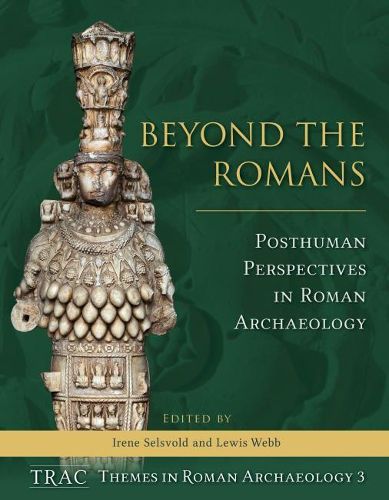Readings Newsletter
Become a Readings Member to make your shopping experience even easier.
Sign in or sign up for free!
You’re not far away from qualifying for FREE standard shipping within Australia
You’ve qualified for FREE standard shipping within Australia
The cart is loading…






This latest volume in the TRAC Themes in Theoretical Roman Archaeology series takes up posthuman theoretical perspectives to interpret Roman material culture. These perspectives provide novel and compelling ways of grappling with theoretical problems in Roman archaeology producing new knowledge and questions about the complex relationships and interactions between humans and non-humans in Roman culture and society. Posthumanism constitutes a multitude of theoretical positions characterised by common critiques of anthropocentrism and human exceptionalism. In part, they react to the dominance of the linguistic turn in humanistic sciences. These positions do not exclude the human , but instead stress the mutual relationship between matter and discourse. Moreover, they consider the agency of non-humans , e.g., animals, material culture, landscapes, climate, and ideas, their entanglement with humans, and the situated nature of research. Posthumanism has had substantial impacts in several fields (including critical studies, archaeology, feminist studies, even politics) but have not yet emerged in any fulsome way in Classical Studies and Classical Archaeology. This is the first volume on these themes in Roman Archaeology, aimed at providing valuable perspectives into Roman myth, art and material culture, displacing and complicating notions of human exceptionalism and individualist subjectivity. Contributions consider non-human agencies, particularly animal, material, environmental, and divine agencies, critiques of binary oppositions and gender roles, and the Anthropocene. Ultimately, the papers stress that humans and non-humans are entangled and imbricated in larger systems: we are all post-human.
$9.00 standard shipping within Australia
FREE standard shipping within Australia for orders over $100.00
Express & International shipping calculated at checkout
This latest volume in the TRAC Themes in Theoretical Roman Archaeology series takes up posthuman theoretical perspectives to interpret Roman material culture. These perspectives provide novel and compelling ways of grappling with theoretical problems in Roman archaeology producing new knowledge and questions about the complex relationships and interactions between humans and non-humans in Roman culture and society. Posthumanism constitutes a multitude of theoretical positions characterised by common critiques of anthropocentrism and human exceptionalism. In part, they react to the dominance of the linguistic turn in humanistic sciences. These positions do not exclude the human , but instead stress the mutual relationship between matter and discourse. Moreover, they consider the agency of non-humans , e.g., animals, material culture, landscapes, climate, and ideas, their entanglement with humans, and the situated nature of research. Posthumanism has had substantial impacts in several fields (including critical studies, archaeology, feminist studies, even politics) but have not yet emerged in any fulsome way in Classical Studies and Classical Archaeology. This is the first volume on these themes in Roman Archaeology, aimed at providing valuable perspectives into Roman myth, art and material culture, displacing and complicating notions of human exceptionalism and individualist subjectivity. Contributions consider non-human agencies, particularly animal, material, environmental, and divine agencies, critiques of binary oppositions and gender roles, and the Anthropocene. Ultimately, the papers stress that humans and non-humans are entangled and imbricated in larger systems: we are all post-human.